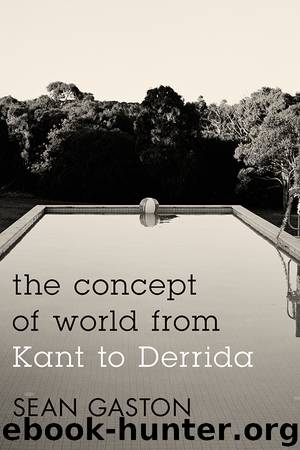The Concept of World from Kant to Derrida by Gaston Sean

Author:Gaston, Sean [Gaston, Sean]
Language: eng
Format: epub
Publisher: Rowman & Littlefield International
Published: 2013-01-09T16:00:00+00:00
Chapter Six
World, Fiction and Earth
1. Literature and the Impossibility of World
Having examined the concept of world in the history of philosophy from Kant to Derrida, in this final chapter I would like to turn to other related problems that we have touched on in previous chapters: the question of the fiction of world, the relation between the concepts of world and earth and the possibility of a philosophy without world. Initially, I will focus on a number of influential twentieth-century readings of Hegel’s Phenomenology of Spirit to explore how philosophy invents its own worlds and how the tradition of the philosophical concept of world can be challenged by rethinking the fictional worlds of literature. I will then turn to some recent critical ecological or earth-oriented readings of Derrida’s work to examine how the possibilities of the concept of world are limited by a valorisation of the earth as its ideal and absolute other. Finally, I will conclude by briefly addressing the impasses in advocating a philosophy without world. In the history of philosophy since Kant, there has always been the possibility that there is no world, but an emphatic declaration of its end only reflects the desire to escape philosophy itself.
Kojève, Hyppolite and Blanchot
As we have seen, like Kant before him, Hegel was unable to start the Phenomenology with a concept of world. In the first sections of the Phenomenology, there is the sense, perception and understanding of things, but there is no explicit discussion of world itself. Kant himself only turns to the world itself in the Critique of Pure Reason in the Transcendental Dialectic when world is no longer a possible object of experience and becomes a problem of the systematic unity of the ideas of reason. In the Phenomenology, Hegel marks the emergence of the supersensible world and its antagonistic relation to actuality in his account of self-consciousness and reason, but it is only when consciousness rises to the stage of spirit that one can speak of the actual world as the world of spirit. It is then that we understand retrospectively that it is these spiritual worlds that have given the discrete shapes, domains and spheres of each developing stage of the Phenomenology. It is only when we come to spirit that we realize that we were never without world.
One could argue that in their influential readings of Hegel, Alexandre Kojève and Jean Hyppolite both produce their own fictional worlds by attempting to read this absent world into the earlier sections of the Phenomenology. This creation of a fictional world in the midst of Hegel’s text is compounded by their interest in Hegel’s apparent discussion of literary writers and literature in general in the final stages of consciousness’s journey through reason. Kojève and Hyppolite’s works on Hegel appeared in 1946–1947 and are both cited by Maurice Blanchot in his ostensible review of their books, “Literature and the Right to Death” (1947–1948). This forty-page article not only raises the question of the relation between Hegelian philosophy, the
Download
This site does not store any files on its server. We only index and link to content provided by other sites. Please contact the content providers to delete copyright contents if any and email us, we'll remove relevant links or contents immediately.
| Deconstruction | Existentialism |
| Humanism | Phenomenology |
| Pragmatism | Rationalism |
| Structuralism | Transcendentalism |
| Utilitarianism |
The remains of the day by Kazuo Ishiguro(8946)
Tools of Titans by Timothy Ferriss(8346)
Giovanni's Room by James Baldwin(7301)
The Black Swan by Nassim Nicholas Taleb(7086)
Inner Engineering: A Yogi's Guide to Joy by Sadhguru(6776)
The Way of Zen by Alan W. Watts(6575)
Asking the Right Questions: A Guide to Critical Thinking by M. Neil Browne & Stuart M. Keeley(5740)
The Power of Now: A Guide to Spiritual Enlightenment by Eckhart Tolle(5723)
The Six Wives Of Henry VIII (WOMEN IN HISTORY) by Fraser Antonia(5484)
Astrophysics for People in a Hurry by Neil DeGrasse Tyson(5169)
Housekeeping by Marilynne Robinson(4420)
12 Rules for Life by Jordan B. Peterson(4292)
Double Down (Diary of a Wimpy Kid Book 11) by Jeff Kinney(4252)
The Ethical Slut by Janet W. Hardy(4232)
Skin in the Game by Nassim Nicholas Taleb(4223)
Ikigai by Héctor García & Francesc Miralles(4219)
The Art of Happiness by The Dalai Lama(4115)
Skin in the Game: Hidden Asymmetries in Daily Life by Nassim Nicholas Taleb(3973)
Walking by Henry David Thoreau(3938)
